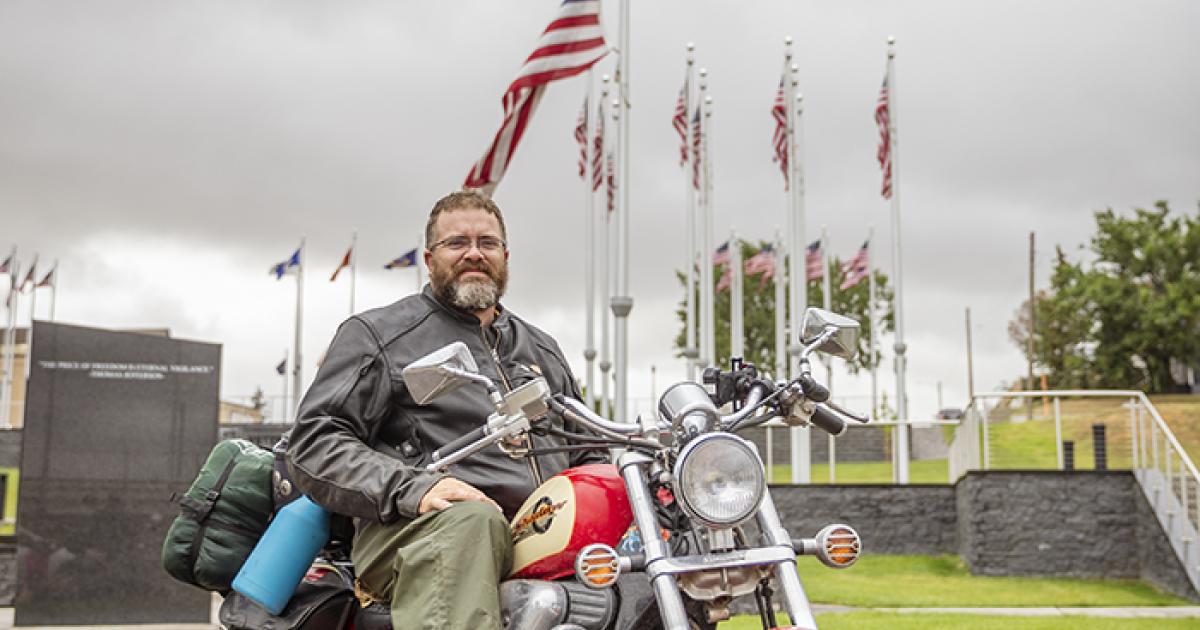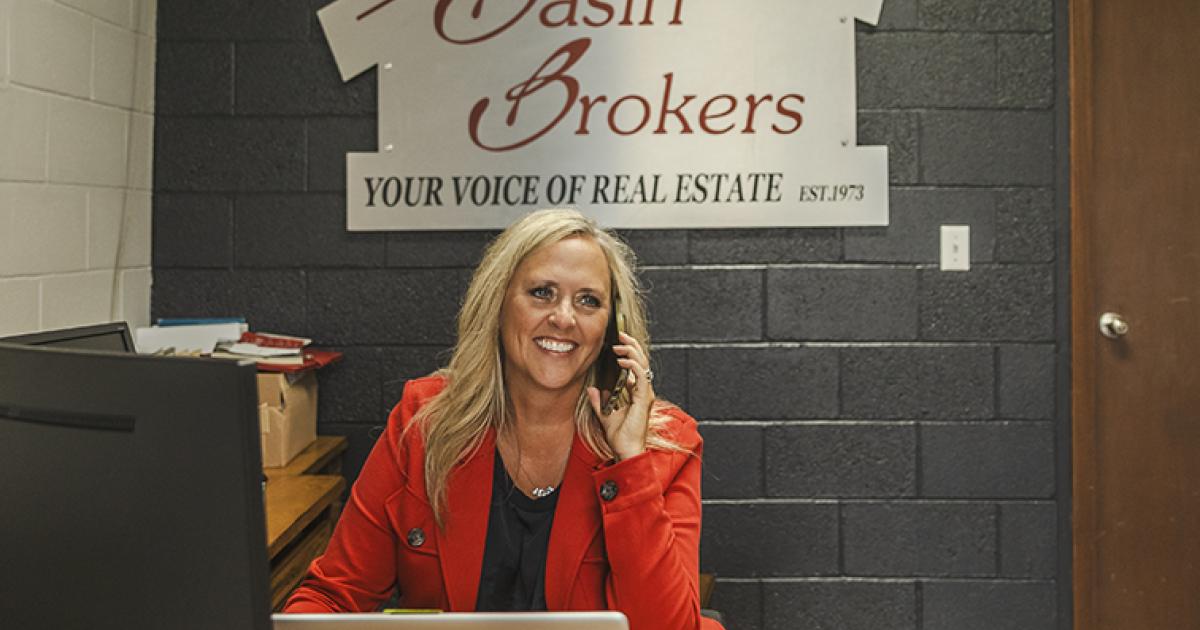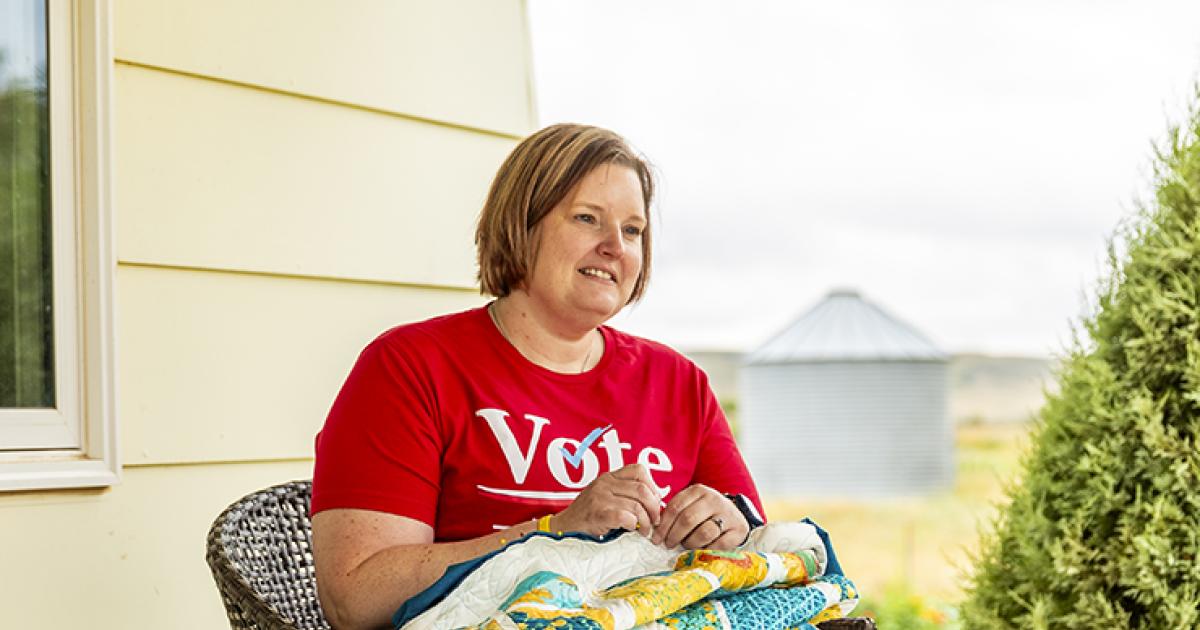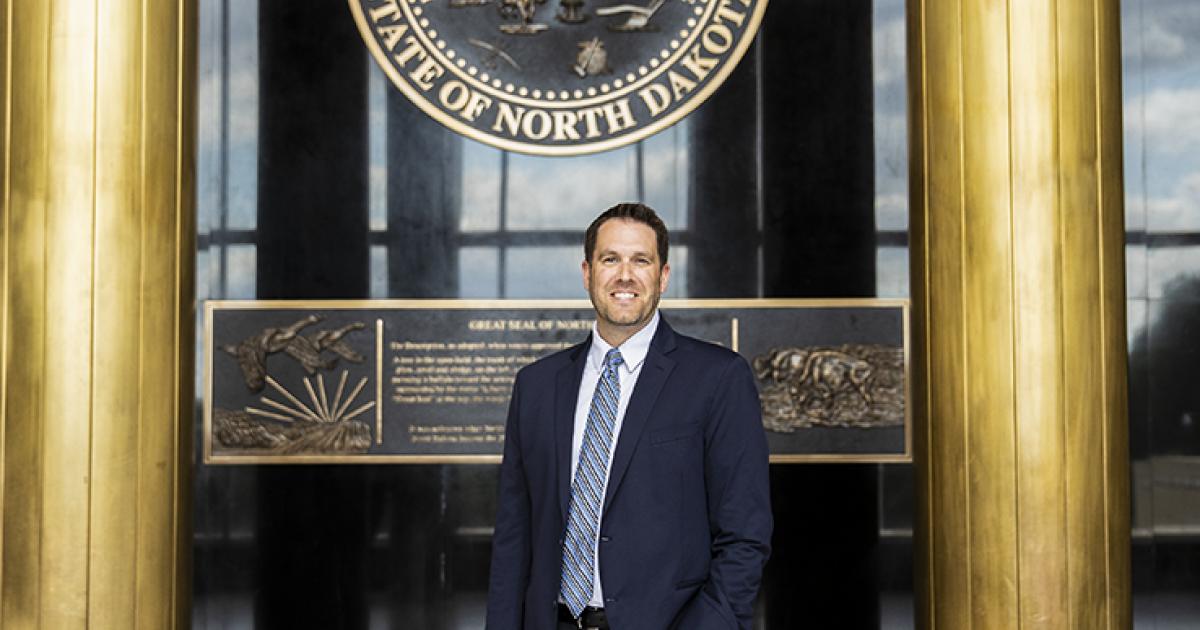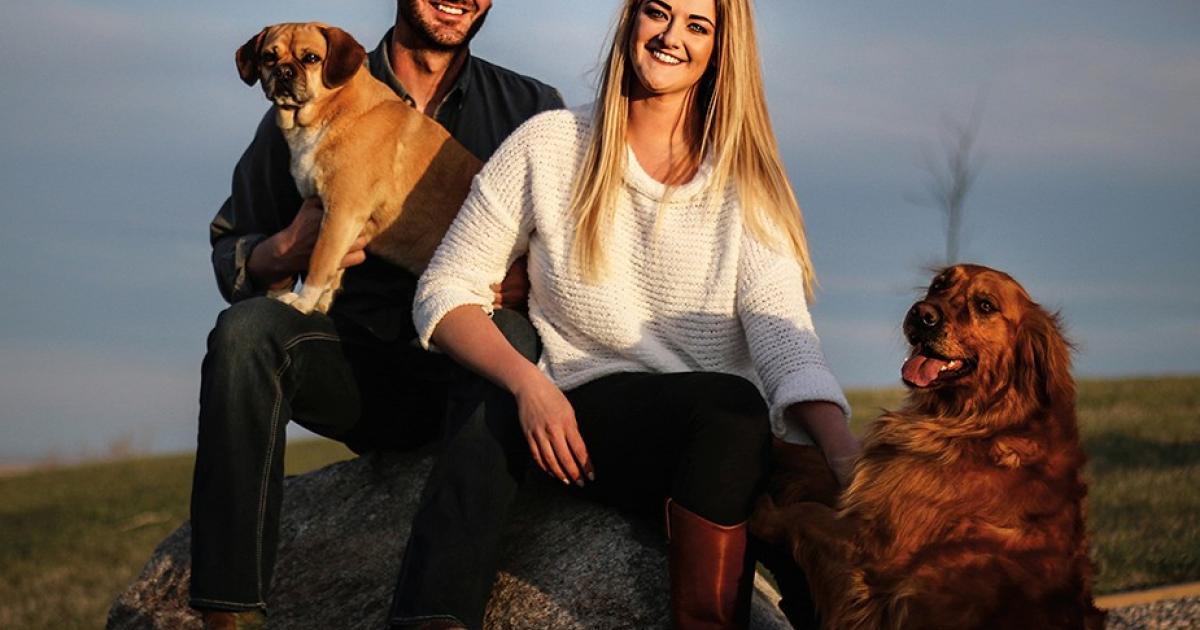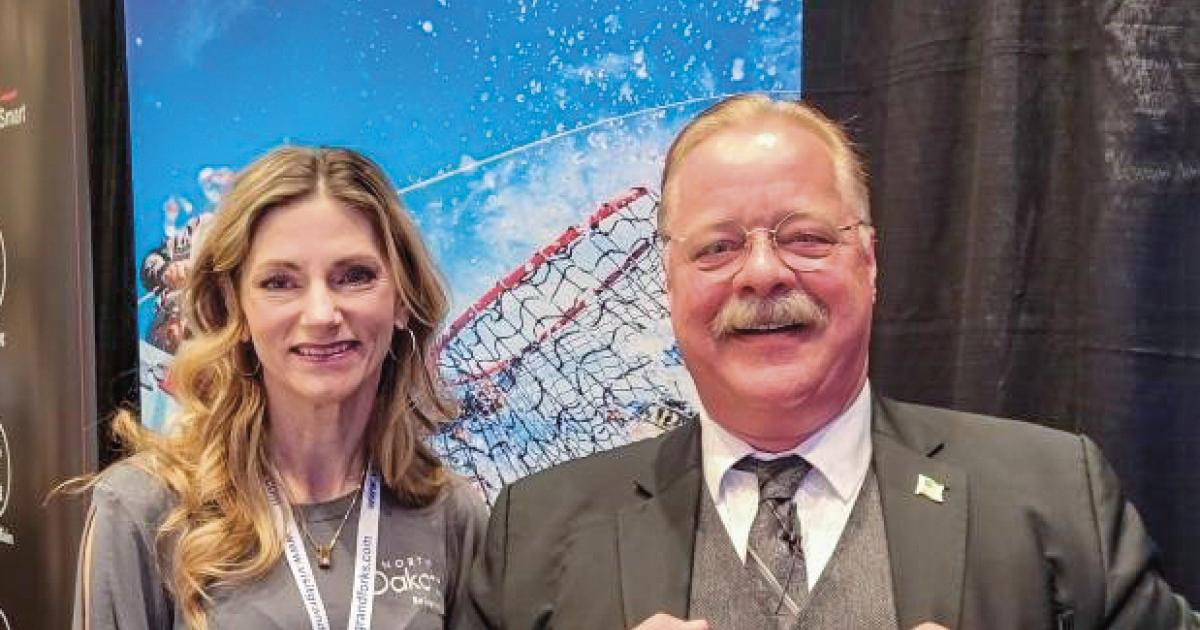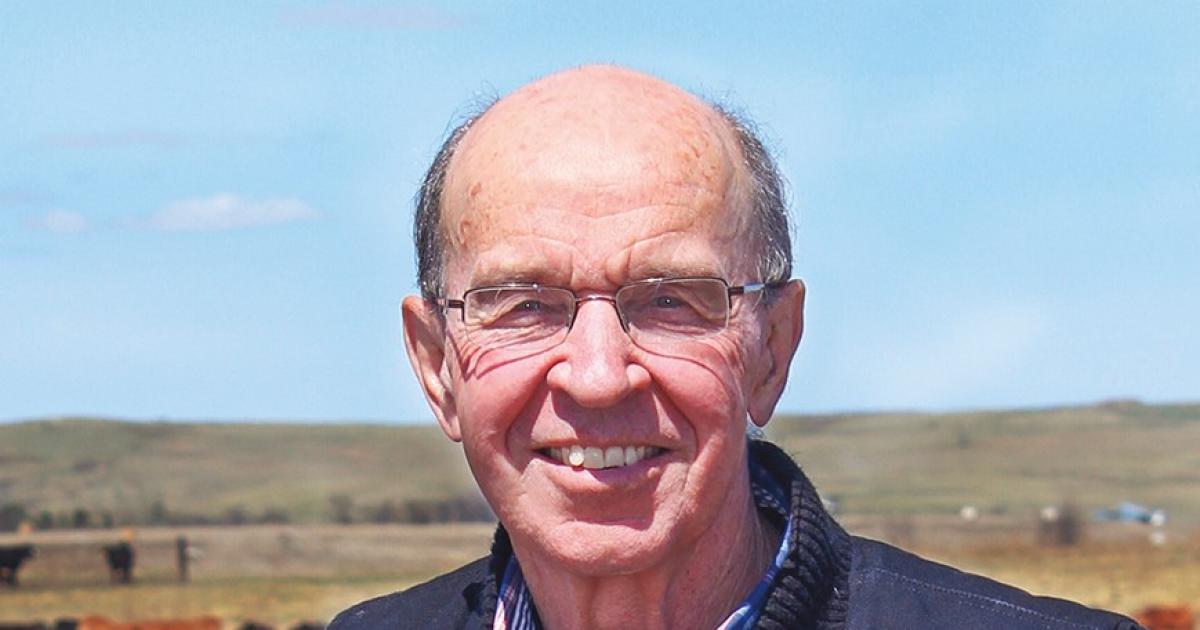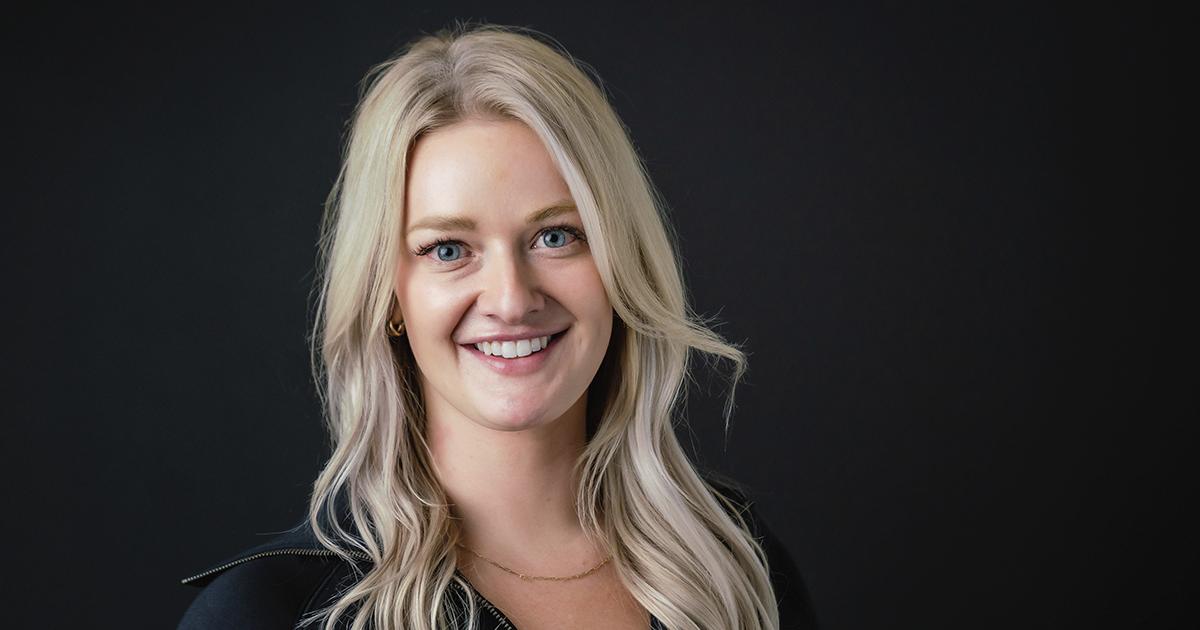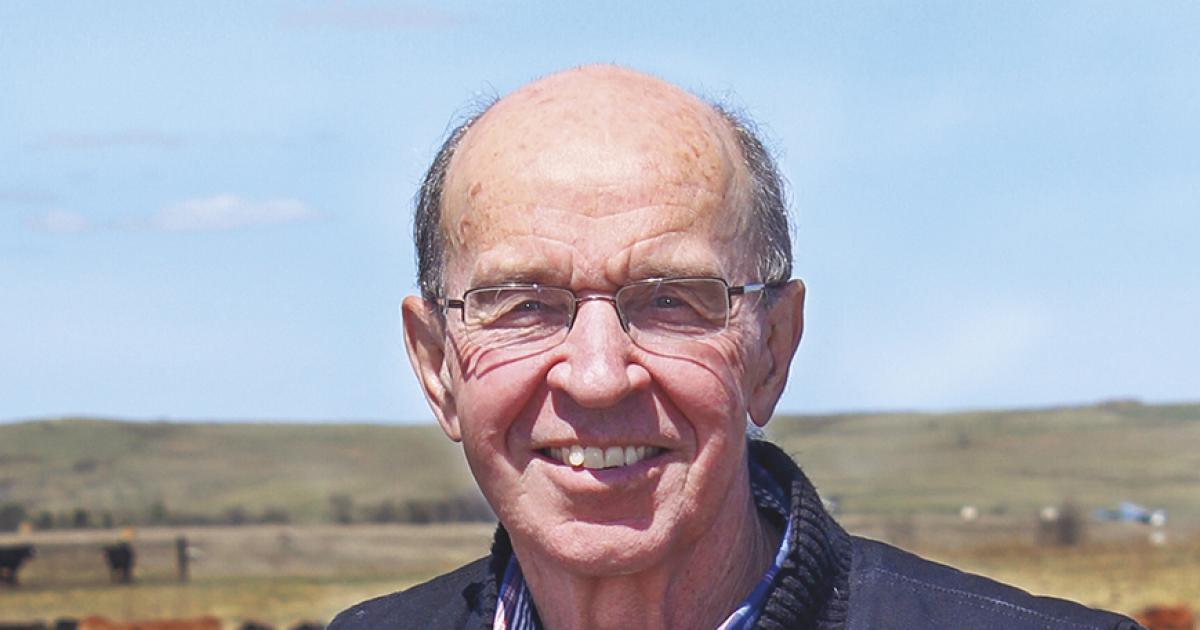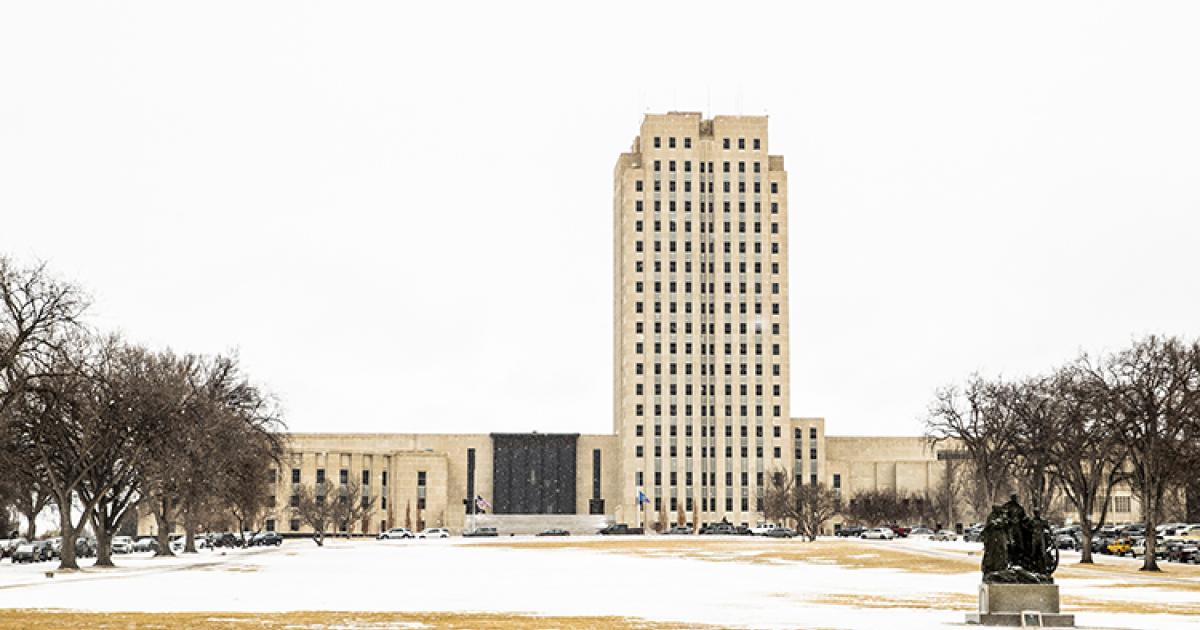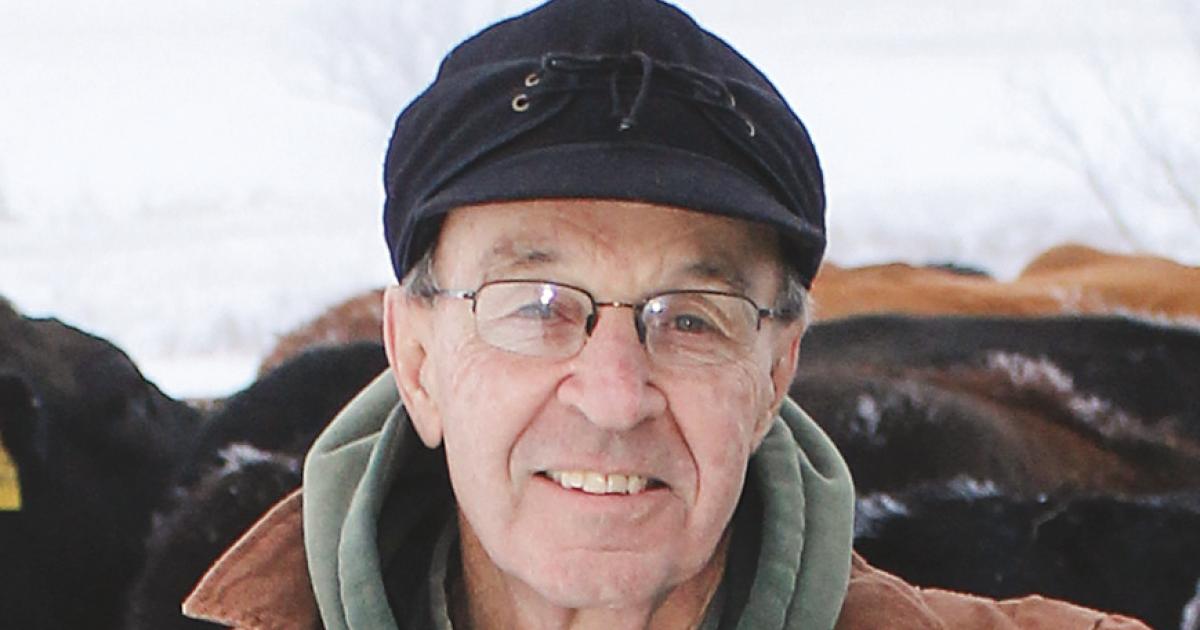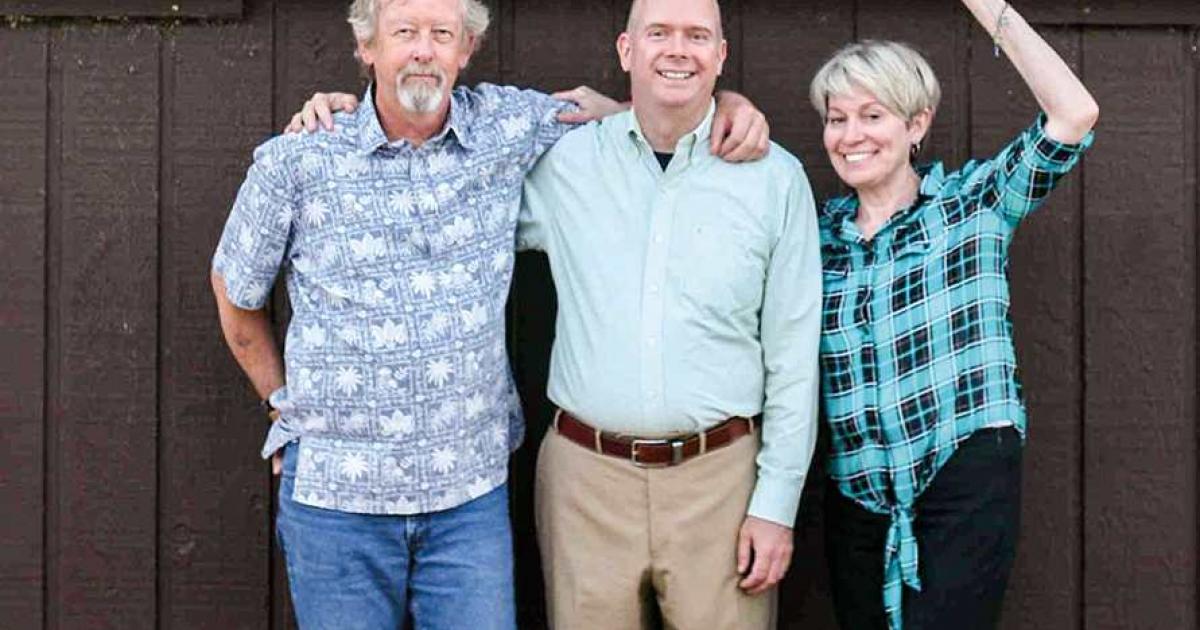Small engine repairman Andrew Noel. Photo by NDAREC/Kennedy DeLap
A gardener, quilter and fourth-generation McKenzie County resident living on her grandparents’ homestead. A mom and trusted local real estate agent. A U.S. Air Force veteran and Montana transplant turned McKenzie County resident. A proud new dad and long-suffering Minnesota Vikings fan.
What do they all have in common? They are among the more than 3,000 North Dakotans who run North Dakota elections. And, they’re your neighbors.
“(Election workers) are the boots on the ground and ensure the election process works. And without them – who are everyday North Dakotans, I should point out – this process couldn’t work,” says N.D. Secretary of State Michael Howe.
LOCAL ELECTIONS RUN LOCALLY
Erica Johnsrud was appointed the McKenzie County auditor/treasurer in 2017, then subsequently elected to the position in 2018 and 2022. A cell biologist with a Ph.D., Johnsrud returned home to a new McKenzie County in August 2013.
“A lot had changed since I had left,” she says.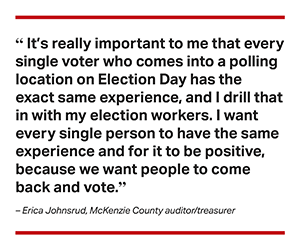 The western North Dakota oil boom attracted new people, businesses and infrastructure into McKenzie County. From 2010 to 2020, McKenzie County grew 131%, from 6,360 to 14,707 people, and Watford City grew 256%. McKenzie County was the fastest growing county in the United States by percentage, according to data released by the U.S. Census Bureau following the 2020 census.
The western North Dakota oil boom attracted new people, businesses and infrastructure into McKenzie County. From 2010 to 2020, McKenzie County grew 131%, from 6,360 to 14,707 people, and Watford City grew 256%. McKenzie County was the fastest growing county in the United States by percentage, according to data released by the U.S. Census Bureau following the 2020 census.
“We certainly have seen an increase in the number of people and the different types of people that come in on Election Day to vote,” Johnsrud said. “And although Watford City has changed, elections don’t change a whole lot.”
In fact, that’s what Johnsrud expects.
“I don't care if you're 100 years old, you're asked if you're 18. If you're my husband, you're asked if you're a U.S. citizen,” she says.
“It’s really important to me that every single voter who comes into a polling location on Election Day has the exact same experience, and I drill that in with my election workers,” she says. “I want every single person to have the same experience and for it to be positive, because we want people to come back and vote.”
Like all county auditors in North Dakota, Johnsrud works with her county commission to make decisions about local elections. State law provides uniformity in North Dakota’s election processes, but preserves local control.
“All 50 states have their own set of election laws,” Howe says. “North Dakota is a top-down state, so the secretary of state’s office oversees North Dakota election processes. Each individual county then runs their own election, but those individual counties are all following the same laws. They have the same ballot layouts and equipment. All this is standardized across the state.”
“It’s a collaborative process. With the commission and myself, we obviously know our community well. So, the commission, along with some guidance from me, they decide where our polling places are going to be. Then it’s my job to find those election workers. Local district party chairs are also able to appoint from their membership election workers that work at the polling locations,” Johnsrud says. “It’s really up to the county to decide what works best for our citizens, then it’s up to me to make sure we meet our requirements.”
“The toughest job is with the ‘Erica Johnsruds’ of the world and our 53 county auditors. They’re doing all the hard work. They’re finding the polling locations. They’re finding poll workers,” Howe says.
Polling locations are commonly placed in community buildings, schools and churches.
“They’re all in very familiar places,” Johnsrud says.
At the McKenzie County polling location in Cartwright, dessert is served alongside ballots.
“Everyone used to get a piece of pie and coffee when you came to vote, and now they have other desserts, but you can still sit and chat with your neighbors and your friends as they’re coming in to vote on Election Day,” she says. “The poll workers have organized that forever.”
And you should see familiar faces in those polling places, too.
“It’s important to me that you have familiar faces, and also that we’re representative of the community,” she says. “We’ve had a large influx of folks that have moved here. So not every single person sitting in the polling location is a North Dakota native, but hopefully there’s somebody there that you (as a voter) can relate to.”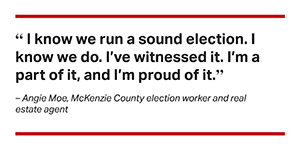 McKenzie County, which had 17.83% voter turnout in the June primary election according to the secretary of state website, requires about 23 to 26 workers among its three polling locations on Election Day.
McKenzie County, which had 17.83% voter turnout in the June primary election according to the secretary of state website, requires about 23 to 26 workers among its three polling locations on Election Day.
Election workers arrive early in the morning to hang signs and site information, set up equipment and count ballots.
“One really important piece of election security is the ‘ballots in’ in the morning equal the ‘ballots out’ at night,” Johnsrud says. “I certify to them the number of ballots by type that I’m leaving them in the morning. They make sure that’s what they receive from me, then they make sure at the end of the night, that’s how many ballots they return back to me.”
Another election security measure is a seal on the equipment. Election workers must verify in the morning the equipment is sealed, then those seals must be returned to Johnsrud at the end of the night, when she verifies the seals from each location.
During the day, clerks check in voters using Poll Pads that locate the voter’s record in the central voter file (CVF). The CVF is software developed specifically for administering North Dakota elections. Any citizen issued a North Dakota driver’s license or non-driver’s ID is automatically recorded in the CVF.
Election judges hand voters their ballots, and an inspector is the onsite person in charge on Election Day. An absentee board also works on Election Day to process the absentee ballots received.
Poll workers are required to attend training, and much is learned by volunteers throughout the election process.
“The biggest takeaway is they come out and they say, ‘I never knew all of the things that went into holding an election,’ and they have a much greater appreciation for the election process,” Johnsrud says.
‘THIS IS WHY WE’RE AMERICA’
“It makes my heart happy, that whole day,” McKenzie County election worker and real estate agent Angie Moe says of Election Day. “It’s heartwarming. There’s a level of ‘this is why we’re America.’ We get to do this, all of us. There are so many people in the world that would love to have a say and they don’t get to, or they get killed. … We are so lucky, and I never want to forget about that.”
Volunteering as an election worker always interested Moe. So, when Johnsrud asked her if she’d consider working the election, she agreed.
Since then, she has been both a clerk and a judge, for elections with “wall-to-wall people all day long” and the slower ones, too.
“The day is really fun, because I see a lot of people I haven’t seen in a long time. There’s a lot of hugs, a lot of catching up with neighbors and community members,” Moe says. “And they trust us, and it shows in how the day goes. (The voters), they’re excited to see us, and we’re glad people come in and vote.”
“I love that women get to vote. That wasn’t always the case, so I want to represent the female population. I’m proud to vote, and I’ve always been proud to be an American,” she says.
Moe encourages others interested in learning more about North Dakota elections to contact their county auditor and volunteer as a poll worker.
“They would not regret it, and they would probably learn something,” she says.
‘THIS IS IMPORTANT’
Andrew Noel is so passionate about North Dakota elections, he left his first Sturgis Motorcycle Rally a day early to be interviewed by North Dakota Living for this story!
“When Erica’s like, ‘Hey, we got an interview,’ I said I’ll bend over backwards to be there. Yeah, this is important. It is,” Noel says.
Sitting in his rain overalls fresh off Highway 85, he warms his hands on the cup of coffee offered to him by one of Johnsrud’s employees in the auditor’s office. Oil brought the Montana native and U.S. Air Force veteran to McKenzie County six years ago, but he was laid off in 2020 during the industry downturn. He started a small engine repair business and did odd jobs on the side to get by, one of which included working his first election in 2020.
“November 2020 is when I first helped, and they said it was volunteer, but you got paid for it. The money at the time helped,” Noel says.
Four years later, Noel no longer does it for the money.
“Everybody that’s working cares. Everybody that’s working is passionate about that service,” he says.
Outside of the work on Election Day, election volunteers enjoy a potluck-style lunch together, because they’re not allowed to leave. And when the polls are slow, they play cards or cribbage.
“It’s like a family, right?” Noel says.
NORTH DAKOTA ELECTION INTEGRITY
Having a front-seat view of how North Dakota elections are run, both Moe and Noel express confidence in the safety, security and integrity of North Dakota elections.
“You see what’s going on around the country? It’s like, man, that’s hard to hear,” Noel says. “There’s no safer place that I’ve been in where I voted. I mean, the first time I voted was down in Florida, but our elections (in North Dakota), it’s pretty secure, pretty locked down. I have full faith in it.”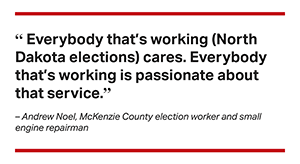 “Honestly, in my head, I’m not sure how people do voter fraud, because it is not possible. How come that’s such a big topic?” Moe says. “It just makes me thankful for Erica and her group, because I know we run a sound election. I know we do. I’ve witnessed it. I’m a part of it, and I’m proud of it.”
“Honestly, in my head, I’m not sure how people do voter fraud, because it is not possible. How come that’s such a big topic?” Moe says. “It just makes me thankful for Erica and her group, because I know we run a sound election. I know we do. I’ve witnessed it. I’m a part of it, and I’m proud of it.”
In 2022, the state auditor’s office released a review of the security of the state of North Dakota’s election system. Secure Yeti, the third-party contractor who conducted the review, “State of North Dakota Voting Process Security Assessment,” identified six vulnerabilities. On a five-point scale of risk, from critical to very low, all six vulnerabilities were identified as low. No scenarios were deemed critical, high or medium risk.
The assessment team found an election system with comprehensive safeguards at all levels, and it remains unlikely the results of an election in North Dakota would be fraudulently influenced, the report states.
“Election integrity has been a very hot topic across the country for the last four years, but in North Dakota, the state Legislature was really dealing with election integrity before it was cool,” Howe says.
North Dakota has a voter ID law, mandates the use of paper ballots and doesn’t mail out ballots without a voter first requesting one. Its election equipment is not connected to the internet, and all equipment is publicly tested before Election Day. All of those safeguards were in place before the 2020 election, Howe says.
“We’ll talk to anybody, anytime, anywhere, about this,” Howe says. “But the biggest, most important thing I try to convey to the people of North Dakota is that our elections in North Dakota are different than other states, and I think that’s a good thing.”
“What you see on the news media, on social media, this happened in this state or this happened in that state, always keep in mind that may not happen in North Dakota. That may not even be applicable in North Dakota because of how our elections are run in North Dakota,” he says.
THE RIGHT TO VOTE
Come Election Day, voters in McKenzie County can expect to see smiling, friendly faces at the polls. Chief among them will be Johnsrud, Moe and Noel. They’ll be happy to see you – and all their neighbors – exercising the right to vote.
“It’s really about having a say in what happens locally, because the decisions that impact you the most as a citizen are made by your city or your county commissioners. It’s not necessarily the people in Washington who are really impacting you, but you need to know what’s happening locally in order to be, in my opinion anyway, a good citizen,” Johnsrud says.
Maybe it’s her McKenzie County roots, or something deeply instilled in her, passed down through four generations of family, from a time not so long ago when her great-grandmothers didn’t have the right to vote.
“My favorite thing about Election Day is when you walk into a polling location and there’s a person there voting for the first time. Oh, I love that,” she says. “You know, a new American or a new 18-year-old, or we’ve had, sometimes, somebody who’s voted and can remember their mother telling them they remembered when women couldn’t vote. Or maybe they were 100 years old, but they’re like, ‘I’m voting, because I remember a time when that wasn’t an option.’”
___
Cally Peterson is editor of North Dakota Living. She can be reached at cpeterson@ndarec.com.


